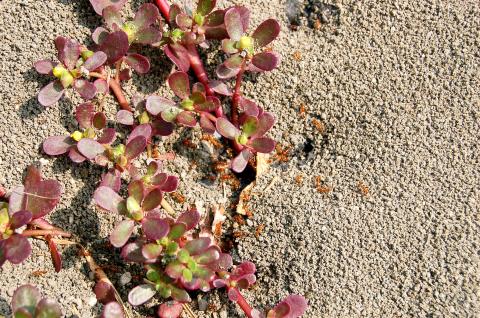The total area in Taiwan affected by exotic red fire ants has increased by nearly 50 percent since 2003, but despite the growing infestation, the government budget for pest control was cut from last year’s NT$40 million (US$1.36 million) to NT$20 million this year.
Listed among the world’s top 100 most-invasive species, the ants, native to South America, were discovered in Taiwan in 2003 and have alarmed residents by quickly spreading through urban areas in Greater Taipei, Taoyuan, Hsinchu, Miaoli and Chiayi counties.
The ants not only pose a serious threat to Taiwanese ecology, but the necrotizing alkaloid in their venom can cause a blister or pustule — which earned them their name — that can cause a person to go into shock or can even be fatal if the person is allergic.

Photo: Chen Tsan-kun, Taipei Times
In 2004, the Council of Agriculture (COA) established a national red exotic fire ant prevention center tasked with containing the spread of the ants within a 36,000-hectare radius, but last year the center increased its containment area to 55,000 hectares.
According to the center, in 2007 there were 1,619 known locations of red fire ant activity, but last year known locations had increased to 2,440. The center said that in five years, Hsinchu County alone had seen an increase from 23 locations to 244, while New Taipei City (新北市) saw a 250 percent increase in ant activity, going up from 177 locations to 453.
National red fire ant prevention center director Huang Rong-nan (黃榮南) said that when the ants were accidentally introduced to Australia in 2001, the total infected area stood at about 60,000 to 70,000 hectares. The Australian government assigned a team of 600 people to combat the pests, and even used planes to spray a pesticide to contain them.
Taiwan, on the other had, has insufficient manpower to contain the ants, he said.
Huang Chi-sen (黃基森), a professor at National Taipei University of Education’s Program of Environmental Education and Resources, has been monitoring the activities of the ants for many years. Huang said that because of Taiwan’s geography, prevention and control of the ants would prove to be difficult.
“Now that the funding has been slashed, I’m afraid that it will be increasingly difficult to contain the ants,” he said.
The government should not give up, Huang said, because between 7 million and 8 million people live in the infested area. Huang said that the US suffers US$5 billion in losses per year because of the ants.
In response to why the COA was slashing funding for ant prevention, Fei Wen-chi (費雯綺) of the Bureau of Animal and Plant Health Inspection and Quarantine said the budget cut was the result of financial troubles at the central government.
Despite the financial difficulties, the budget was still enough to ensure high-level prevention and containment, Fei said, adding that the council would employ alternative methods to contain the ants.
“We have adjusted our strategies for this year,” she said. “While Taoyuan County will be under full prevention and containment as a ‘heavy disaster’ area, the bureau will treat other infested areas as hotspots and adjust its strategy accordingly.”
Translated by Jake Chung, staff writer

Taiwanese can file complaints with the Tourism Administration to report travel agencies if their activities caused termination of a person’s citizenship, Mainland Affairs Council Minister Chiu Chui-cheng (邱垂正) said yesterday, after a podcaster highlighted a case in which a person’s citizenship was canceled for receiving a single-use Chinese passport to enter Russia. The council is aware of incidents in which people who signed up through Chinese travel agencies for tours of Russia were told they could obtain Russian visas and fast-track border clearance, Chiu told reporters on the sidelines of an event in Taipei. However, the travel agencies actually applied

Japanese footwear brand Onitsuka Tiger today issued a public apology and said it has suspended an employee amid allegations that the staff member discriminated against a Vietnamese customer at its Taipei 101 store. Posting on the social media platform Threads yesterday, a user said that an employee at the store said that “those shoes are very expensive” when her friend, who is a migrant worker from Vietnam, asked for assistance. The employee then ignored her until she asked again, to which she replied: "We don't have a size 37." The post had amassed nearly 26,000 likes and 916 comments as of this

New measures aimed at making Taiwan more attractive to foreign professionals came into effect this month, the National Development Council said yesterday. Among the changes, international students at Taiwanese universities would be able to work in Taiwan without a work permit in the two years after they graduate, explainer materials provided by the council said. In addition, foreign nationals who graduated from one of the world’s top 200 universities within the past five years can also apply for a two-year open work permit. Previously, those graduates would have needed to apply for a work permit using point-based criteria or have a Taiwanese company

The Shilin District Prosecutors’ Office yesterday indicted two Taiwanese and issued a wanted notice for Pete Liu (劉作虎), founder of Shenzhen-based smartphone manufacturer OnePlus Technology Co (萬普拉斯科技), for allegedly contravening the Act Governing Relations Between the People of the Taiwan Area and the Mainland Area (臺灣地區與大陸地區人民關係條例) by poaching 70 engineers in Taiwan. Liu allegedly traveled to Taiwan at the end of 2014 and met with a Taiwanese man surnamed Lin (林) to discuss establishing a mobile software research and development (R&D) team in Taiwan, prosecutors said. Without approval from the government, Lin, following Liu’s instructions, recruited more than 70 software